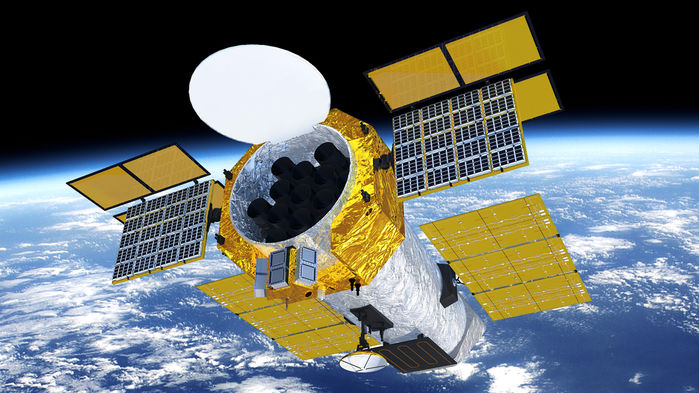

The enhanced X-Ray Timing and Polarimetry mission, planned for launch around 2025, would probe x-rays from violent, fast-changing cosmic events. INSTITUTE OF HIGH ENERGY PHYSICS
China is raising the stakes in its bid to become a major player in space science. At a kick-off meeting in Beijing last week, China's National Space Science Center, part of the Chinese Academy of Sciences (CAS), began detailed design studies for a satellite that would round out an array of orbiting platforms for probing x-rays from the most violent corners of the cosmos.
The enhanced X-Ray Timing and Polarimetry (eXTP) mission would be China's most ambitious space science satellite yet—and its most expensive, with an estimated price tag of $473 million. To pull it off, China is assembling a collaboration involving more than 200 scientists so far from dozens of institutions in 20 countries. If the eXTP mission passes a final review next year, it would launch around 2025.
Chinese scientists "are becoming leaders in the field of x-ray astrophysics," says Andrea Santangelo, an astrophysicist at the University of Tübingen in Germany and eXTP's international coordinator. Last year, the National Space Science Center launched the Hard X-ray Modulation Telescope, which is observing high-energy objects such as black holes and neutron stars. As early as 2021 it will be joined by the Einstein Probe, a wide-field x-ray sentinel for transient phenomena such as gamma ray bursts and the titanic collisions of neutron stars or black holes that generate gravitational waves. "For years we have used data from U.S. and European missions," says eXTP Project Manager Lu Fangjun, an astrophysicist at the CAS Institute of High Energy Physics in Beijing. Now, he says, "We want to contribute [observational data] to the international community."
For more details, please refer to http://www.sciencemag.org/news/2018/03/china-unveils-plans-x-ray-satellite-probe-most-violent-corners-universe.

86-10-68597521 (day)
86-10-68597289 (night)

52 Sanlihe Rd., Xicheng District,
Beijing, China (100864)

